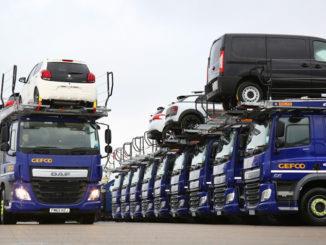
Global group Gefco, which owns Gefco UK, saw revenues fall by almost a fifth last year after Covid-19 forced the closure of its customers’ car manufacturing plants.
Announcing its results for the year to 31 December 2020, Gefco, which is 75% owned by Russian Railways and 25% owned by Peugot, Citroen and Vauxhall manufacturer, Group PSA, revealed a 19.7% drop in overall revenues to €3.8bn (£3.3bn).
The group’s finished vehicle logistics (FVL) division saw its turnover plunge by almost 22% to £1.3bn (2019: £1.7bn) in the period, after being hit by the closure of customers’ car factories due to the Covid-19 pandemic.
However the group’s overland and contract logistics division, which brought in the lion’s share of the group’s revenues for the year, was not as badly affected, thanks to its diversified customer portfolio, with turnover falling by just under 20% to £1.6bn (2019: £2bn).
Despite seeing recurring earnings before interest and tax (EBIT) decline by 31.5% to £121.8m (2019: £177.7m) in the period, the group said that it was a “significant” performance under the circumstances, helped by strong cost control, a £579.1m (€667.4m) reduction in cost of third-party services, and business recovery during the third and fourth quarters of 2020. The group added that the final quarter had been “the strongest Q4 in Gefco’s history in terms of operating profit”.
Read more
- Brexit and new accounting regime hit profits at Gefco UK
- Gefco Group gearing up for IPO
- Gefco’s £10m Liverpool hub goes live
Announcing the results, Luc Nadal, chairman of the management board of GEFCO, remained upbeat. He said: “I am proud of GEFCO’s 2020 results which demonstrate resilience despite the negative impact of the Covid pandemic on our business, especially in the first half of the year.
“As an agile, asset-light business, we were able to control costs while going the extra mile to meet our customers’ needs. Our revenues declined in April, May and June at the height of major global disruptions in global business, but during the second half of 2020 we were able to increase our activities in line with our customers’ production ramp-up schedules."
He added: “Working in a spirit of cooperation and understanding, we continued to help automotive customers find solutions to keep their supply chains moving, including our historical client Groupe PSA.
“For non-automotive customers, we pursued diversification and adapted our multimodal logistic solutions to meet their changing needs.
“Our time-critical solutions by air and road were in high demand among customers in the healthcare, consumer goods and electronics industries, and we were able to rise to their challenges.”













